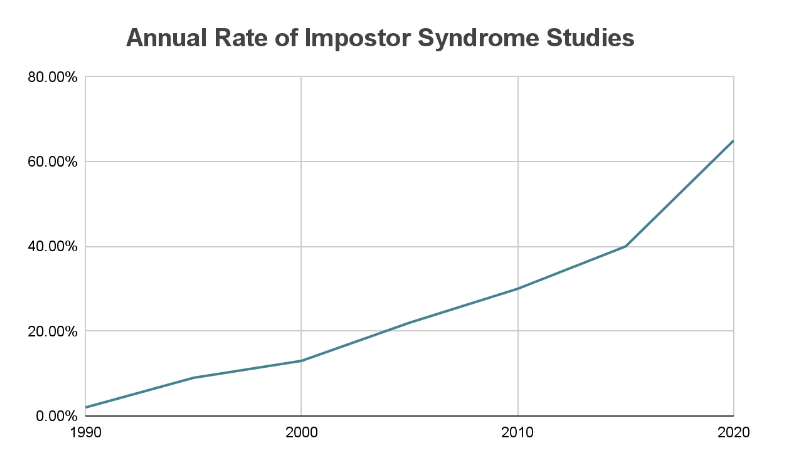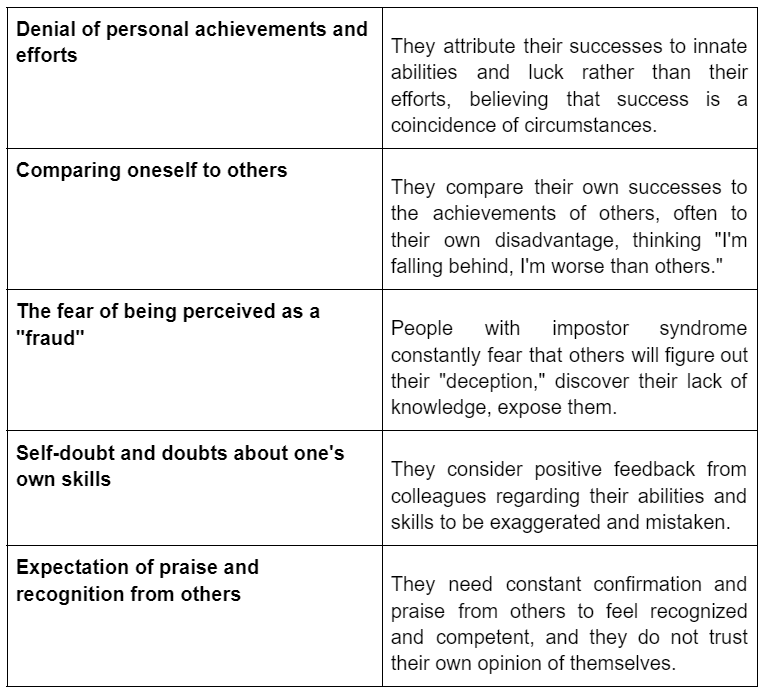Over the past 20 years, there have been periodic publications about Impostor Syndrome. In this article, we will examine what the syndrome is, the reasons for its emergence and development. We will also explain how it manifests, its potential dangers (is it contagious?), how to live with it, and whether it is possible to get rid of it. Most importantly, we will discuss why it is important to be aware of it.
Unconscious false belief about oneself
Impostor Syndrome is a psychological state in which a person does not acknowledge their successes or personal achievements. They consider these accomplishments undeserved and disown them. This can apply to various aspects of life:
- In the workplace - "I have too little experience for this position."
- In the family - "I am a bad husband," "I am a bad daughter."
In the midst of external success at work, even with academic accolades and competence, a person experiences a constant feeling of deceiving others. They are tormented by thoughts that their deception will soon be exposed, and everyone will discover their incompetence. They fear that their achievements are a fluke, a coincidence, or simply luck. Psychologists say that this state is not a manifestation of false modesty but an unconscious cognitive error.
"Unconscious" means that a person is not aware of their distorted perception of reality. Something within them prevents them from attributing their personal successes to their hard work, skills, and efforts. Instead, they find external explanations, such as luck or even the mistaken beliefs of their colleagues. Their personal view of themselves is distorted.
- Impostor syndrome is a cognitive error which makes people think they are not as good as others think of them
- This error messes up one’s perception of oneself, causing the person to unconsciously bring themselves down
Origin of the term
In 1978, psychologist Pauline Clance and psychologist Suzanne Imes first proposed the term "impostor syndrome." They studied the behavior and emotional state of over 150 women who were recognized professionals, holders of doctoral degrees, and held high positions in science and industry. The study showed that despite having grounds for confidence in their competence, most participants inadequately evaluated their personal achievements. They attributed their accomplishments to factors such as luck, chance, the inattentiveness of colleagues, external attractiveness, and even manipulation. Over the past 10 years, many more people have become aware of this problem. Unfortunately, most of them have learned about it firsthand.

What concerns people with signs of impostor syndrome
Psychologists note that clients seeking psychological help often complain of feelings of anxiety, helplessness, and uncertainty, as well as a fear of showing an "not enough" level of knowledge or inability in a new field. Such thoughts poison life, leading to despondency, constant pressure, and stress-related disorders. These are the signs and behavioral characteristics typical of people in this condition:

The constant pressure from endless thoughts and doubts can lead to a more serious condition, such as depression. Let's consider the possible root causes of the syndrome.
The causes of the false self-perception
Impressed beliefs from childhood
Familiar behavioral patterns, false beliefs, and reactions are acquired in childhood and then carried into adult life. Doubts about abilities and knowledge stem from how parents and close associates (grandparents, caregivers, and teachers) communicate with children, praising and criticizing them. However, the roots of this problem are not only found in childhood.
Assessment by superiors and significant individuals
It happens that when a leader sharply expresses their opinion about an employee's abilities in the presence of colleagues, it can trigger doubts. Anxiety arises, leading to overthinking: "Am I really doing things right? Is this what is expected of me?"
The lack of feedback
Often, people don't understand their own strengths and virtues, lacking a clear understanding of their level of knowledge in their field of activity. Without the skill of reflection, people don't compare their "present self" with their "past self." In childhood, this can happen due to the lack of normal feedback from parents and adults. For instance, a child excels in mathematics. Parents and teachers perceive this as something natural, without any reaction or acknowledgment. This devalues the efforts of the growing child. As an adult, they continue to undervalue their own achievements. Therefore, for mental health and adequate self-esteem, feedback is crucial for both children and adults.
The influence of the cultural environment: unmet expectations
If parents expect specific academic results, such as straight A's in history, and their child brings home B's, they may react negatively. They might not acknowledge the child's efforts and hard work. The child grows up with the feeling that they haven't met expectations, haven't earned recognition, "they are not what they should be." It's important for every child to receive praise and support from their parents, regardless of their achievements: they are learning, working hard, trying, and growing. A wise parent communicates to their child in various ways: "You're doing great, I see your efforts, I like your attitude."
Instead of encouragement and motivation, attention is given to shortcomings
Employers believe that performing well at work is a duty. Instead of encouragement, more attention is paid to finding shortcomings, unfinished tasks, and mistakes. However, fulfilling job responsibilities is precisely an indicator of daily efforts and conscientiousness. A good leader will always say kind words and recognize the efforts of employees.
Fortunately, there are examples of a different corporate culture where greater importance is placed on motivating employees, and the successes of each worker are welcomed rather than failures being seen as opportunities for further development.
Manifestations of insecurity and insufficient preparation are rarely encountered in companies where employees are praised. Here, workers are aware of their own worth, significance, and impact on the work process. Symptoms of impostor syndrome are unlikely to arise in such environments.
- There are several probable causes of false self-perception
- One of these causes comes from childhood, when parents or teachers would not praise an achievement or when there was a lack of attention
- Another cause is a lack of feedback, which is important at any age but particularly crucial in teenage years when a person may struggle to evaluate themselves correctly
- Constant focus on mistakes and failures instead of achievements and successes
How to recognize the presence of the syndrome
It is difficult to recognize the impostor syndrome on your own without experience and knowledge. A practicing psychologist in a consultation can help you understand your subconscious beliefs, but this is not the only way. Colleagues can help identify signs of discrepancy between your feelings and the facts. For example, if a friend says, "Your presentation was great, you delivered it coherently and logically, and you answered the questions well; you did a great job!" and you feel discomfort or confusion, thinking, "Is this really about me?" it's worth reflecting on. Asking yourself why your perceptions differ from others' perceptions can be important. It's important to realize and reflect on this, and it's often best done with a therapist. However, a useful piece of advice here is to recognize that your feelings don't always reflect the true picture of reality.
Negative consequences
An employer takes advantage of your weakness
Imagine the employer notices how you react to external evaluations of your work. By exploiting the employee's weakness, the employer acts in their own interest, presses on feelings of guilt, and manipulates. This already constitutes an abuse of the manager's rights.
Stagnation in professional development
If an employee does not recognize their own contribution to the work process, they may not dream of career growth because they do not realize their merits. The lack of career development does not lead to salary increases. Such people miss the chance to take advantage of interesting opportunities and do not show initiative.
The pursuit of perfection
A person with impostor syndrome is afraid to take on new tasks. Due to their own doubts, they delay starting work or spend too much time trying to achieve the perfect result. They miss deadlines because they endlessly refine the project. This is evident in creative individuals such as artists, web designers, and architects.
How to help yourself
If possible, seek help from a psychologist or psychotherapist, and talk about your feelings and concerns. If you want to address your misconceptions on your own, try the following:
- Evaluate your achievements. To do this, create a list of ten skills that help you in your profession. Consider that your colleagues use these same skills. If you encounter familiar doubts, ask yourself: what are the grounds for these doubts, where are the facts? You will find that the facts are just your feelings. And they do not coincide with the opinions of your friends or colleagues.
- Develop a habit of evaluating your accomplishments at the end of the day. Praise yourself for each completed task: “Who's awesome? - I'm awesome! I did this and that, learned something new, applied it in practice, clarified details.” Reflection helps to truly realize that your efforts correspond to the results.
- Start sharing your knowledge. Offer help to colleagues when they are in difficulty. This way, you will gain confidence in your own knowledge and skills.
As we conclude this article, we wish you to be attentive to your own thoughts. Positive thoughts add confidence, while negative ones unsettle the nerves. Bring order to your mind so that work brings joy!
